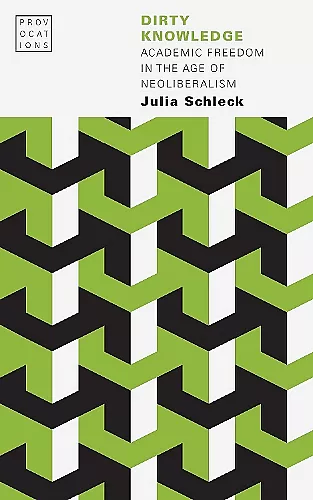Dirty Knowledge
Academic Freedom in the Age of Neoliberalism
Format:Paperback
Publisher:University of Nebraska Press
Published:1st Jan '22
Should be back in stock very soon

Dirty Knowledge explores the failure of traditional conceptions of academic freedom in the age of neoliberalism. While examining and rejecting the increasing tendency to view academic freedom as a form of free speech, Julia Schleck highlights the problem of basing academic freedom on employment protections like tenure at a time when such protections are being actively eliminated through neoliberalism’s preference for gig labor. The argument traditionally made for such protections is that they help produce knowledge “for the public good” through the protected isolation of the Ivory Tower, where “pure” knowledge is sought and disseminated.
In contrast, Dirty Knowledge insists that academic knowledge production is and has always been “dirty,” deeply involved in the debates of its time and increasingly permeated by outside interests whose financial and material support provides some research programs with significant advantages over others. Schleck argues for a new vision of the university’s role in society as one of the most important forums for contending views of what exactly constitutes a societal “good,” warning that the intellectual monoculture encouraged by neoliberalism poses a serious danger to our collective futures and insisting on deliberate, material support for faculty research and teaching that runs counter to neoliberal values.
"Dirty Knowledge provides a valuable account of academic freedom and the importance of faculty governance in the age of academic capitalism. . . . Schleck emphasizes that academic freedom does not provide a unified public good but offers a forum for competing definitions of public good. . . . This is crucial reading for faculty and higher education administrators."—S. R. Fitzgerald, Choice
“In Dirty Knowledge Julia Schleck shows how the conflation of academic freedom with freedom of speech erodes the academic nature of academic freedom and serves the atomizing purposes of neoliberalism; she also shows how the casualization of the academic workforce undermines academic freedom altogether. This is one of the very few books on academic freedom that ties the concept to the economic conditions of the profession—and one of the very few books on neoliberalism in the university that treats ‘neoliberalism’ as a coherent body of belief rather than as an all-purpose epithet. Required reading for anyone interested in the future of academic freedom and the future of the academy.”—Michael Bérubé, Edwin Erle Sparks Professor of Literature at Pennsylvania State University
ISBN: 9781496221438
Dimensions: unknown
Weight: unknown
148 pages